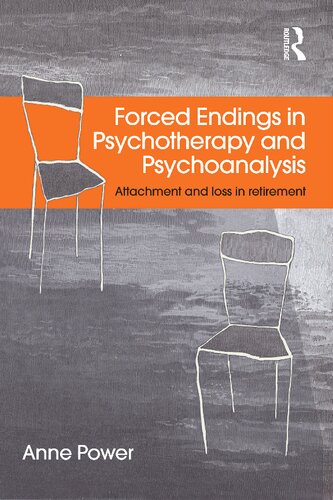

Most ebook files are in PDF format, so you can easily read them using various software such as Foxit Reader or directly on the Google Chrome browser.
Some ebook files are released by publishers in other formats such as .awz, .mobi, .epub, .fb2, etc. You may need to install specific software to read these formats on mobile/PC, such as Calibre.
Please read the tutorial at this link. https://ebooknice.com/page/post?id=faq
We offer FREE conversion to the popular formats you request; however, this may take some time. Therefore, right after payment, please email us, and we will try to provide the service as quickly as possible.
For some exceptional file formats or broken links (if any), please refrain from opening any disputes. Instead, email us first, and we will try to assist within a maximum of 6 hours.
EbookNice Team

Status:
Available4.3
25 reviewsForced Endings in Psychotherapy and Psychoanalysis:Attachment and Loss in Retirement explores the ambivalence the therapist may feel about letting go of a professional role which has sustained them. Anne Power explores the process of closing a private practice, from the first ethical decision-making, through to the last day when the door of the therapy room shuts. She draws on the personal accounts of retired therapists and others who had to impose an ending on clients due to illness, in order to move house, to take maternity leave or a sabbatical.
A forced ending is an intrusion of the clinician’s own needs into the therapeutic space. Anne Power shows how this might compromise the work but may also be an opportunity for deeper engagement. Drawing on attachment theory to understand how the therapeutic couple cope with an imposed separation, Power includes interviews with therapists who took a temporary break to demonstrate the commonality of challenges faced by those who need to impose an ending on clients.
Forced Endings in Psychotherapy and Psychoanalysis opens up an area which has been considered taboo in the profession so that future cohorts can benefit from the reflections and insights of this earlier generation. It will support clinicians making this transition and aims to support ethical practice so that clients are not exposed to unnecessary risks of the sudden termination of a long treatment. This book will be essential reading for practicing psychotherapists and psychoanalysts, and to undergraduate and post-graduate students in clinical psychology, psychiatry and social work